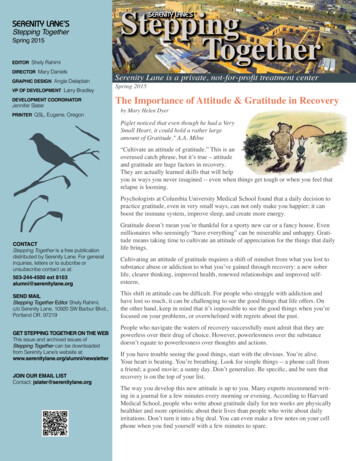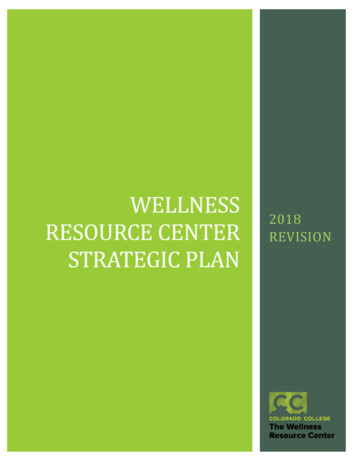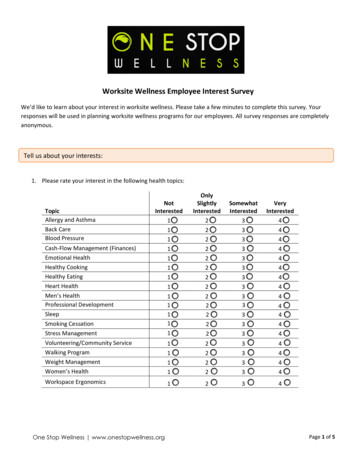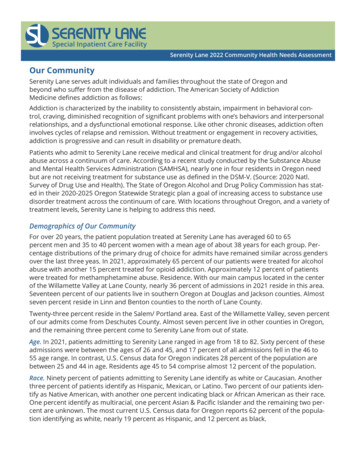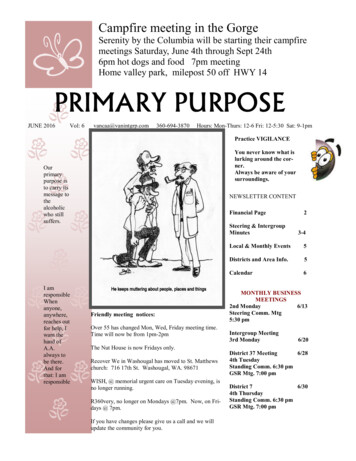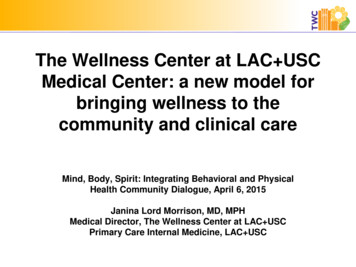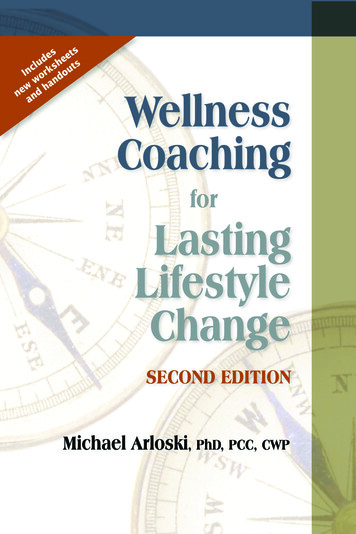
Transcription
Serenity Wellness CenterPlot No: 220C Mutandwa Road, RomaPost Net 398, Arcades, Lusaka, Zambia 260 979 979 318 260 211 294 .orgProject Title: Support Addiction Treatment for 30 Youths in ZambiaDuration: 30 days including weekends and public holidaysTarget Population: 15 Men and 15 Women Struggling with Substances from Low Resource Settings of Lusaka,ZambiaTotal Project Budget: (USD): 50,000.001. BACKGROUND AND HISTORY OF ORGANIZATION:Our Vision: A society enjoying quality mental health and wellness.Mission: Our mission is to promote optimal mental health through culturally adapted therapeutic, educational andsupport services at corporate, community, family and individual levels.Serenity Wellness Center (SWC) is a Mental Health Wellness Centre established in March 2019 as a social enterprisewing alongside the Non-Governmental Organization (NGO) known as Serenity Harm Reduction programme Zambia(SHARPZ) which has been in existence for more than 10 years. SWC is registered with PACRA as a non-profit entitylimited by guarantee by the Capuchin Franciscan Order in Zambia as a response to emerging mental health challengeswithin the general population of Zambia.There is a growing consensus that problems connected with harmful use of alcohol and drugs are increasing. Zambiansshare the common effects of harmful use of alcohol and drugs with people everywhere in the world and the consequencesof such use impact on personal, social, health, financial, spiritual, legal and economic dimensions of a person’s life.Substance abuse often time is entwined with other health challenges, referred to as interconnected risks, such asHIV/AIDS, criminalization, poverty, Gender based violence (GBV), Intimate Partner Violence (IPV), to mention but afew.Strategically, SWC was incorporated as a vehicle organization to contribute towards attaining Sustainable DevelopmentGoals (SDGs) 2030 pillar 3, which states as follows:"3.4 By 2030, reduce by one third premature mortality from non-communicable diseases through prevention andtreatment and promote mental health and well-being.""3.5 Strengthen the prevention and treatment of substance abuse, including narcotic drug abuse and harmful use ofalcohol."SWC is comprised of specialized and well experienced staff and consultants who have been offering mental healthservices for over 10 years of practice under SHARPZ, the non-government organization wing. Excluding the board ofDirectors, SWC has six clinical staff and three support staff. We hope to expand in size and quality as demand for mentalservices.SWC works hand in hand with other partners providing health services more so around mental health, detoxificationservices, HIV/AIDS services, Non communicable Diseases, etc.2. KEY PROGRAMS AND ACTIVITIESI) FAMILY SERVICESIncludes couple therapy (pre- and post-marital), parenting courses and support groups, adoption counselling, transitioncounselling for families following such issues as divorce, bereavement, financial turmoil, major illness, etc.II) INDIVIDUAL THERAPYPsychotherapy and counselling, art therapy, learning support to address such needs as depression, stress, Trauma,addictions, HIV & AIDS counselling, etc.III) CORPORATE SERVICESA society enjoying quality mental health and wellness
Serenity Wellness CenterPlot No: 220C Mutandwa Road, RomaPost Net 398, Arcades, Lusaka, Zambia 260 979 979 318 260 211 294 .orgSWC recognizes that every workplace is different. Thus, we tailor the EAP structure, referral system and promotion tosuit individual needs, preferences and any unique cultural characteristics within an organization.We provide Employee Assistance Programmes (EAP) in form of Psychotherapy, walk throughs, seminars, workshopsto assist manage stress arising from work, personal or family related problems such as bereavement, divorce, traumaticillnesses and accidents and promote wellness. We facilitate smooth organizational transition as well as undertake teambuilding activities. Below are detailed areas covered under EAP:a) Work related mental health challenges: - Alcohol and drug abuse, Problems with performance, Relationships betweenco-workers, Harassment, Managing conflict and anger management, adjusting to change in the workplace, Careerchange, Managing work related stress.b) Personal issues: - Anxiety or depression, Stress management, Grief and loss, Midlife and life transition issues,Emotional or physical abuse, Low self-esteem, Substance abuse, Gambling problems, Anger management.c) Family related issues:- Work-life balance, Concerns about children, Relationship issues, HIV & AIDS counseling,parenting and step-parenting issues, Separation and divorce, Financial or legal problems, Domestic violence, Grief &LossIV) GROUP SERVICESGroup therapy services for use in handling issues such as infertility, depression, grief and bereavement, alcohol andsubstance abuse, etc.V) RESIDENTIAL REHABILITATION PROGRAMThis program is designed for individuals struggling with excessive levels of addiction. It’s a 30 days residential programthat begins with medical detoxification to deal with withdraw symptoms associated with total abstinence or reductionin drug intake. Following the detoxification, treatments such as psychoeducation, group therapy, individual counseling,cognitive behavioral therapy and training in relapse prevention, art therapy, and nutritional based therapy areadministered. Graduates from the residential are connected to existing support group and vocational training centers.VI) CONSULTANCY AND TRAININGWe offer consultancy and training services in our various areas of competence including, Trauma Assessment, alcoholpolicy formulation in the workplace, transition management, wellness programmes, and mental health services.3. NEEDS STATEMENTThere is a growing consensus that problems connected with harmful use of alcohol and drugs are increasing in Zambia.While intravenous drug use is well known in this regard, less recognized is the role that drug abuse plays more generallyin the spread of HIV by increasing the likelihood of high-risk sex with infected partners. The intoxicating effects ofmany drugs can alter judgment and inhibition and lead people to engage in impulsive and unsafe behaviours. Also,people who are abusing or addicted to drugs may engage in sexually risky behaviours to obtain drugs or money fordrugs.The trends of Drug abuse and addiction have been inextricably linked with HIV/AIDS since the beginning of theepidemic According to UNAIDS (2018), in Zambia, 1 200 000 people were living with HIV. The 90–90–90 strategyenvision that, by 2020, 90% of people living with HIV will know their HIV status, 90% of people who know their HIVpositive status will be accessing treatment and 90% of people on treatment will have suppressed viral countries/zambia) Despite these milestone, some populations in Zambiasuch as Drug Addicts, Injection Drug Users (IDUs), Women and Adolescents in low resource settings need programsthat can prevent both substance abuse & HIV/AIDS risks. Substance abuse, like other documented factors, may furthercompound the risk of HIV exposure.Studies have associated alcohol use with HIV infection. A research study conducted at the University Teaching Hospital(UTH) in Zambia observed that apart from alcohol abuse being related to the development of illnesses such as cancer,neuropsychiatric disorders, cardiovascular diseases and cirrhosis of the liver, it is also related to HIV since itA society enjoying quality mental health and wellness
Serenity Wellness CenterPlot No: 220C Mutandwa Road, RomaPost Net 398, Arcades, Lusaka, Zambia 260 979 979 318 260 211 294 .orgelevates the sexual risk taking behaviours such as number of partners, condom use and intimate partner violence(Hammerstein N., Paul R., Ncheka J., 2017). The three researchers made the following recommendations: More alcohol-related interventions might help reduce a further expansion of the epidemic which alreadyaffects around 13% of the Zambian population.That HIV prevention programs should also acknowledge the importance of fighting alcohol abuse.Introducing rehabilitation centers in Zambia as Chainama, a psychiatric hospital is not a professionalrehabilitation center to handle the different stages of alcohol withdrawal.Some studies listed alcohol as one of the three major risk factors for HIV infection among Zambian men (Malhotra N,Yang J, 2011). The relationship between alcohol and HIV goes even further. HIV-infected people who are problemdrinkers are less than half as likely to follow antiretroviral treatment guidelines (Hendershot CS, Stoner SA, PantaloneDW, Simoni JM, 2009).Most clients referred to Serenity Wellness center for psychotherapy are in dire need of medical detoxification andresidential rehabilitation for the first few weeks of therapy. Moreover, a number of them are leaving with HIV. At thesame time, a great majority come from low resource settings of Lusaka.From the foregoing, it is evident that there is need for culturally and cost reflective yet affordable detox and residentialrehabilitation programs catering.4. PROPOSED PROGRAM.Residential rehabilitation denotes a drug addiction treatment program offered to patients in a residential setting. Patientsreside at the residential treatment facility for the duration of their treatment program. The length of treatment timedepends on the type of addiction, duration and frequency of use, any co-occurring addictions or mental health disorders,and other factors. In most cases, detoxification, or detox, is required before beginning formal treatment.The proposed in-patient residential program is a short term treatment program for 30 days to be conducted at AssisiHouse Retreat House. Assisi House is nestled in a quiet, wooded acres of St. Bonaventure University College, Makeni- Lusaka. The center is supported by the Order of Minor Friars of St. Francis of Assisi, a religious congregation of priestsand brothers who are dedicated to walking with people in their search for God. However, participants need not belongto any religious faith or tradition to qualify.The goal is to rehabilitate and support at least thirty (30) persons struggling with substance addiction on their journeyto sobriety or harm reduction in view of HIV/AIDS vulnerability. Therefore, the program will target: Only persons with mild to high addiction levels,leaving with or at risk of HIV infection, andwith socio-economic vulnerability as identified by community gate-keepersHence, three (3) low resource setting communities have been earmarked in Lusaka based on two variables, namely;drug abuse and HIV prevalence, namely Chibolya Compound (central Lusaka), Ng’ombe Compound (Northen Lusaka)and George Compound (Western Lusaka). With an HIV prevalence of about 15.7%, Lusaka province is among thegreatest HIV burden provinces in Zambia.The program will combine pharmacological and psychotherapeutic interventions, below is the expected treatment andsupport plan before and after the 30 days program:i.A clinician, using motivational interviewing behavioral therapy, will perform thorough substance abusetest/assessment, which includes a detailed drug or alcohol use history and examination for any pertinent medical issuessuch as HIV/AIDS status or mental health issues.ii.A program professional (psychotherapist/psychologist) will develop individual treatment plans to ensure thatthe program meets individual specific needs.iii.Detoxification will be accessible to clear the body off the drug and manage withdrawal symptoms that mayset in. A certified medical doctor shall provide the services.A society enjoying quality mental health and wellness
Serenity Wellness CenterPlot No: 220C Mutandwa Road, RomaPost Net 398, Arcades, Lusaka, Zambia 260 979 979 318 260 211 294 .orgiv.Participants will engage in various types of therapy and counseling, depending on personal treatment plans.Individual therapy, group therapy, family meetings, and psycho-education are all potential aspects of your treatmentcourse.v.Throughout the program, therapist will create personalized aftercare plans, which could include continuedtherapy, sober living arrangements, and/or person centered skills development plans. Cognitive-behavioral therapyA typical day in a treatment program will start with breakfast, a couple hours of different group therapy sessions, lunch,more group therapy, as well as some individual or family sessions, gardening, sporting & physical exercises, dinner,Recreational free time or art therapy or group outings, lights out. 24 hours medical and therapeutic support will beoffered by staff members and consultants present at the residence.5. PROGRAM INNOVATION AND SUCCESS FACTORS:The 30 days inpatient rehabilitation program is a multifaceted treatment program. Primarily, it aims at providingtreatment for substance dependence both from a pharmacological and behavioral points of view while simultaneouslyreducing HIV/AIDS related risks among substance users.Combined pharmacological and behavioral treatments for drug abuse have a demonstrated impact on HIV risk behaviorsand incidence of HIV infection. For example, recent research showed that when behavioral therapies were combinedwith pharmacological treatment, approximately one-half of study participants who reported injection drug use at theoutset of the study reported no such use at the end of the study, and over 90 percent of all participants reported no needlesharing. We believe the proposed program will augment measures already in place for HIV prevention.Drug treatment programs such as the 30 days residential rehabilitation program will serve as an important platform inincreasing awareness of HIV status by participant, providing current information on HIV and related diseases,counseling and testing services, and referrals for medical and social services. In particular, this is where the intendedprogram will utilize already existing HIV treatment and prevention programs like AHF during the 30 days rehabilitation.Participants will not only benefit from clinical services AHF will provide but also get empowered to become advocatesat the close of the program.Furthermore, alcohol and substance abuse are common in patients with HIV infection and often complicate treatmentin a number of ways. Alcohol abuse, for example, is associated with poorer adherence to antiretroviral treatment, whichin turn is associated with inadequate viral suppression and the development of antiviral drug resistance. Similarly, HIVinfected patients with opioid dependence are less likely to have access to HIV clinical care, less likely to receive andadhere to antiretroviral therapy, and more likely to have rapid disease progression. In addition, there is some evidenceto suggest that use of different drugs may impact adherence and ART effectiveness differently (Gonzalez A, Barinas J,O’Cleirigh C., 2014). Appropriate treatment of both alcohol and substance abuse in this program will result in improvedadherence to antiretroviral therapy and decreased high-risk behaviours.6. TARGET POPULATION AND GEOGRAPHIC LOCATIONSSerenity Wellness Center has been operational only in Lusaka district of Zambia. In collaboration with the nongovernmental wing, SHARPZ, a lot of work and research has been conducted in a number of high density area of Lusakawith regards to substance abuse. Thus the population earmarked for this program belong to three high density yet lowresource communities of Lusaka namely, Chibolya, Ngombe, and Gorge Compound. However, the center is open to allpersons in need of mental health services.The aforementioned communities are notoriously known to harbor a great majority of people, more so adolescents andyouths abuse substances as well as trafficking illicit drugs. Often, the Zambian police have raided these communities asa way of curbing drug trafficking. However, little efforts are effected to ensure rehabilitation for persons addicted tosubstances.A society enjoying quality mental health and wellness
Serenity Wellness CenterPlot No: 220C Mutandwa Road, RomaPost Net 398, Arcades, Lusaka, Zambia 260 979 979 318 260 211 294 .orgIn particular, we are targeting adolescents and youths, either living with HIV or are at high risk of contraction. Thispopulation has been selected factoring in the high vulnerability levels to both HIV infection and substance dependence.Thirty (30) participants, 15 female and 15 men, will receive treatment and support during the program.7. PROGRAM OUTCOMES AND EVALUATION1. To reduce harms related to substance abuse within the first to six months following residential rehabilitation.2. To lower HIV risk exposures among substance abusers especially IDUs3. To create and enhance community based support systems for persons in recovery8. ACTIVITIES TO ACCOMPLISH THE PROGRAM OBJECTIVESi) To reduce harms related to substance abuse within the first to six months following residential rehabilitation. Identification, Assessment & recruitment of participants in a 30 days residential rehabilitation programMedical examination and DetoxificationPsycho-education for behavioral changeIndividual & group therapyRecreational & Sporting activitiesSupport groups formationii) To lower HIV risk exposures among substance abusers especially IDUs Psycho-education on HIV/AIDS or currently trendsHIV Self-test, VCT and Counselingraise awareness on Sexual reproductive health among adolescents/youth and HIV preventionSexual reproductive health talksLatest HIV preventive measures – PREP,Linkage to HIV careIII) To create and enhance community based support systems for persons in recovery Form support groupsCommunity Sensitization programs by former substance users9. KEY ANTICIPATED OUTCOMES AND IMPACT ON PARTICIPANTS Behavioral change among participantsEnhanced physical health and knowledge through recreational and sports activitiesParticipants are linked to Skills development facilities and acquire skillsFunctional support groups created for program participantsInformed Participants on the interconnection between substance abuse and HIVParticipants know their HIV statusInformed participants on Sexual reproductive healthParticipants know and appreciate HIV preventive measuresEstablished Linkage for HIV care and supportA society enjoying quality mental health and wellness
Serenity Wellness CenterPlot No: 220C Mutandwa Road, RomaPost Net 398, Arcades, Lusaka, Zambia 260 979 979 318 260 211 294 .org10. KEY STAKEHOLDERS AND LONG TERM PROGRAM PROSPECTSPotential funders currently in talks with SWC presents a mixture of traditional donors for non-profits as well as corporateentities out of their social corporate responsibility packages. The Irish embassy, Missio Cara (Ireland), FORUT(Norway), local business organizations such manufacturing companies are willing to partner with us. Any form ofsupport will go towards reaching out to more people and communities in and out of Lusaka City.To successfully conduct community based programs, we collaborate with a number of community lead organizations,Schools, Churches, faith based organization, school as well as government and parastatal entities. We are a member ofthe mental health committee at the Ministry of Health, a member of the epidemiological network under the DrugEnforcement Commission (DEC). Besides that we collaborate with theatre groups especially in sensitization programs.In the long run, we envision to acquire a permanent residential facility with a skills center and clinical dispensary. Landhas been procured awaiting development. The land is located in the outskirts, about 60km east of Lusaka. Constructionof the residential center and other supporting structures will reinforce the provision of efficient and effective qualitytreatment programs in a serene environment.Prepared by:Kapambwe Chikontwe 260971189965Kapas24@yahoo.comNB: Budget attached belowA society enjoying quality mental health and wellness
Serenity Wellness CenterPlot No: 220C Mutandwa Road, RomaPost Net 398, Arcades, Lusaka, Zambia 260 979 979 318 260 211 294 .orgResidential Rehabilitation Program 2020Budget Details and Justification:PAXRATEUnits/%(US Dollars)TOTAL PERSONNEL(US Dollars)PERSONNELDESCRIPTION1 Executive DirectorOversee all aspects of the program in line with theorganisational objectives2 1,100.00 2,200.001 Program DirectorOversee implementation, monitoring and evaluation forprogrammatic aspects of the 30 days residentialprogram2 800.00 1,600.001 Clinical DirectorCoordinators clinical activities during the 30 daysresidential program2 800.00 1,600.001 AccountantProvides assurance about financial information tostakeholders2 350.00 700.001 Administrative AssistantManages and distributes information and filing2 200.00 400.001 Driverprovides secure and timely driving/delivery services2 200.00 400.00 6,900.00SUBTOTALPension Scheme EmployerContribution @5%:Gratuity @25%Pension contribution to the National Pension SchemeAuthority (NAPSA) at 5% employer contribution. Anemployee will contribute 5% to total 10% monthlycontribution for each employeeStatutory Gratuity Payment to employees at 25% totalcontract payNational Health Insurance Scheme Statutory National Health Insurance to cover medicals@ 1%for staff5% 6,900.00 345.0025% 6,900.00 1,725.001% 6,900.00 69.00 9,039.00TOTAL, TE(US Dollars)TOTALPROGRAM/OPERATING(US Dollars)RecruitmentPre-residential programs: identification, selection,Assessment2 200.00 400.00Accommodation & Meals @ 23*30 days * 19 peopleFacilities including Rooms, Conference hall,chapel, counseling rooms, Meals (Breakfast,Lunch, Health Breaks & Supper) for 15 partipantsand 4 Staff on site2 13,110.00 26,220.00Medicals Tests & DetoxificationCosts @ 50 *15 participantsIncludes medical examination and detox costs for20 participants2 750.00 1,500.00Consultancy - Psychotherapist: 700 * 2Personnel to offer individual & group counselingfor 30 days2 1,400.00 2,800.00Consultancy - Psychiatrist: 400*1Personnel to offer specialised detox & Psychiatryrelated services to manage withdraw symptoms2 400.00 800.00Consultancy - Nutritionist: 300 * 1Personnel to offer nutritional based therapy toparticipants & cooks2 300.00 600.00Consultancy - MedicalPersonnel: 700 * 1Medical doctor or nurse to respond toemergencies and manage withdraw symptoms2 600.00 1,200.00Consultancy: Barefeet TheaterGroupArt therapist and theater for development2 600.00 1,200.00Transportation:For logistical support throughout the program2 400.00 800.00StationeryBooks, pens, paper, flip charts to aid programdelivery2 200.00 400.00A society enjoying quality mental health and wellness
Serenity Wellness CenterPlot No: 220C Mutandwa Road, RomaPost Net 398, Arcades, Lusaka, Zambia 260 979 979 318 260 211 294 .orgToiletriesHousehold goods for participants during theprogram2 200.00 400.00CommunicationInternet & phone costs for staff during the program2 200.00 400.00Medical SuppliesFirst aid box & medical supplies for the program2 200.00 400.00Security at the RehabNight & Day security provision at the residentialfacilities2 400.00 800.00 37,920.00 37,920.00TOTAL, sRequested fromContribution AHF (US Dollars)(US Dollars)INDIRECT/OVERHEADEXPENSES (less than GOAL7.5%)Facility costs:Indirect costs including; bank charges, printingand photocopying, Fundraising fees, insurance,telephone & maintenance2 1,520.50TOTALINDERECT/OVERHEAD(US Dollars) TOTAL, INDIRECT/OVERHEADEXPENSESGRAND TOTALPROGRAM/PROJECT BUDGET(US Dollars)0 A society enjoying quality mental health and wellness-3,041.00- 3,041.00 50,000.00
epidemic According to UNAIDS (2018), in Zambia, 1 200 000 people were living with HIV. The 90-90-90 strategy envision that, by 2020, 90% of people living with HIV will know their HIV status, 90% of people who know their HIV-positive status will be accessing treatment and 90% of people on treatment will have suppressed viral loads.

